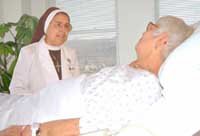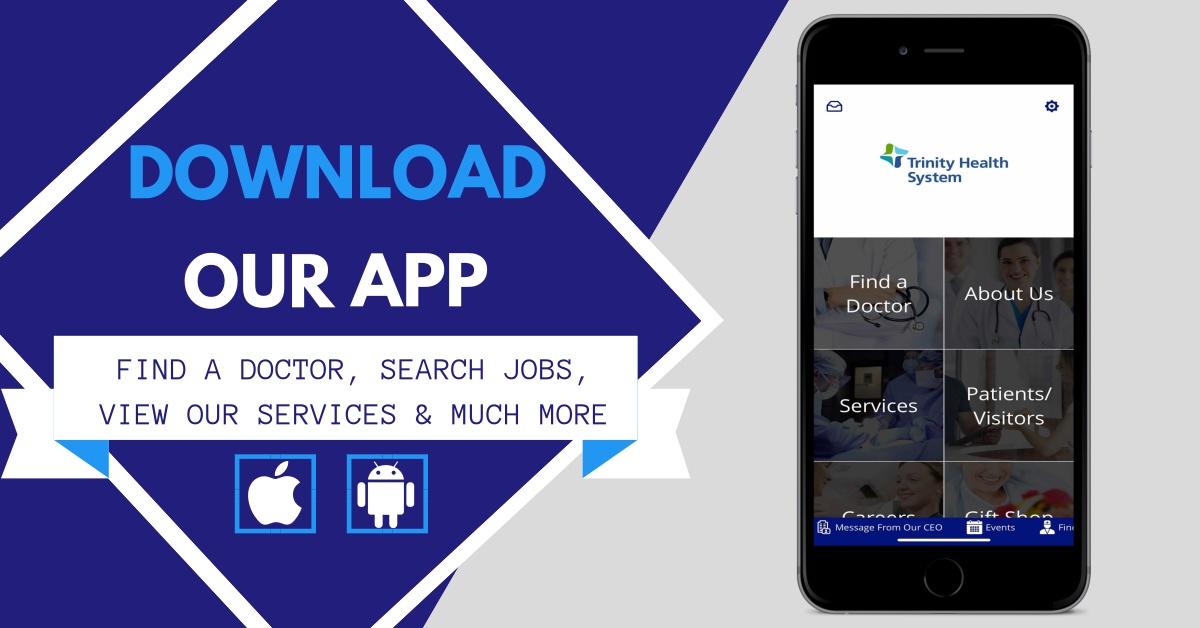Welcome to Trinity Health System!
 Whether we have served you in the past or if you are planning your first visit, we extend to you our sincere welcome.
Whether we have served you in the past or if you are planning your first visit, we extend to you our sincere welcome.
While your visit to the Emergency Department, diagnostic testing or therapeutic services are seldom pleasant experiences, be assured that your well-being is the primary concern of our entire staff.
We work hard to make your visit with us here as pleasant as possible. If you will be visiting us soon, take a moment to review the information on this web site. If we’re missing something you would find helpful‚ let us know!
As an inpatient at Trinity Health System, our staff will coordinate your care so you can return home as soon as possible. If you need anything during your stay, please contact your nurse. Pastoral Care services are also available anytime during your stay. Trinity Health System understands the importance of family and friends visiting while their loved one is hospitalized. Visiting hours for all Medical/Surgical floors are 11:00 AM – 8:00 PM. Specialty units have varying hours for visitation. These units post their visiting hours, so please check with a staff member regarding these hours.
Trinity West also offers Room Service menus for your nutritional needs. Nutritional Department staff members will visit you upon admission to explain the Room Service process and talk with you about your food preferences.
Trinity Health System does not discriminate on the basis of race, color, national origin, disability, or age.
Health Care Checklist for Patients
The single most important thing you can do to ensure good care and prevent medical errors is to be an active partner in your own health care, that means getting involved in your care and asking questions of your physician, your nurse, your technician. Here are some guidelines that may help you. We encourage you to use these tips.
MEDICAL CARE:
- Speak up if you have questions or concerns. You have a right to ask questions of anyone who is involved with your care.
- Make a list of your symptoms and any questions you may have to take with you to your doctor’s office or while you are in the hospital. Take notes to help you remember information.
- Make sure you share important health information with all of the professionals involved in your care. Keep a copy of your health history, including prior illnesses, tests and test results, surgeries, medicines, including how and when you take your medicines, and other treatments and share this information with the people caring for you.
- Ask a family member or a friend to be with you and to be your advocate when you speak with a health care professional or when you are receiving care.
- Find out why a test or treatment is required.
- Ask about the results of your tests. If you do not receive your test results within the time frame that your doctor said you would, call the doctor’s office to follow up.
- Learn about your condition and treatment. Ask your doctor and his staff about where you can find out additional information.
HOSPITALIZATION:
- Make sure that all medicines you take are intended for you. Your nurse should check your identity by looking at your wristband before giving any medication. Before the nurse gives you the medication, ask what medicine they are providing.
- Make sure that those caring for you wash their hands. Hand washing is an important way to prevent the spread of infection. If necessary, remind your caregiver.
- If you are having surgery, make sure you and your doctor are clear on exactly what should be done. The American Academy of Orthopedic Surgeons urges physicians to mark the site where surgery is to be performed with a permanent marker before surgery.
- Understand your treatment plan and what you should and should not do when you go home. Ask questions and repeat answers back to your doctor, nurse or technician to make sure you understand. Research shows that health care professionals think patients understand more than they really do about their care.
- Make sure your caregiver at home understands the treatment plan and is able to take care of your health care needs. If not, tell your doctor or the nurse who helps with your discharge.
MEDICINES:
- Make sure your doctor knows about ALL the medicines you are currently taking prescriptions, and over the counter medicines as well as dietary supplements such as herbs and vitamins. Take a list of your medicines, including dosages, with you.
- Make sure your doctor knows about any allergies you have and previous reactions you have experienced from medicines.
- When your doctor writes a prescription, make sure you can read it. Ask the doctor to print the name of the drug on the prescriptions and the purpose for taking it.
- Ask if the generic brand is appropriate.
- Ask for information about your medicines in terms you can understand:
- How am I supposed to take this medicine and for how long?
- Are side effects likely? What should I do if they occur?
- Is this safe to take with other medicines or supplements I already take?
- Are there foods, drinks or activities I should avoid while taking this medicine?
- When you pick up your medicine at the pharmacy:
- Ask if this is the medicine your doctor ordered.
- Inform your pharmacist of any allergies and other medicines, vitamins and dietary supplements you are currently taking.
- Make sure you understand the directions on the prescription label.
- Ask for written information about possible side effects.
- Ask for a device to measure liquid medicines.
- Be sure to throw away outdated medicines or those medicines that your doctor has discontinued.



